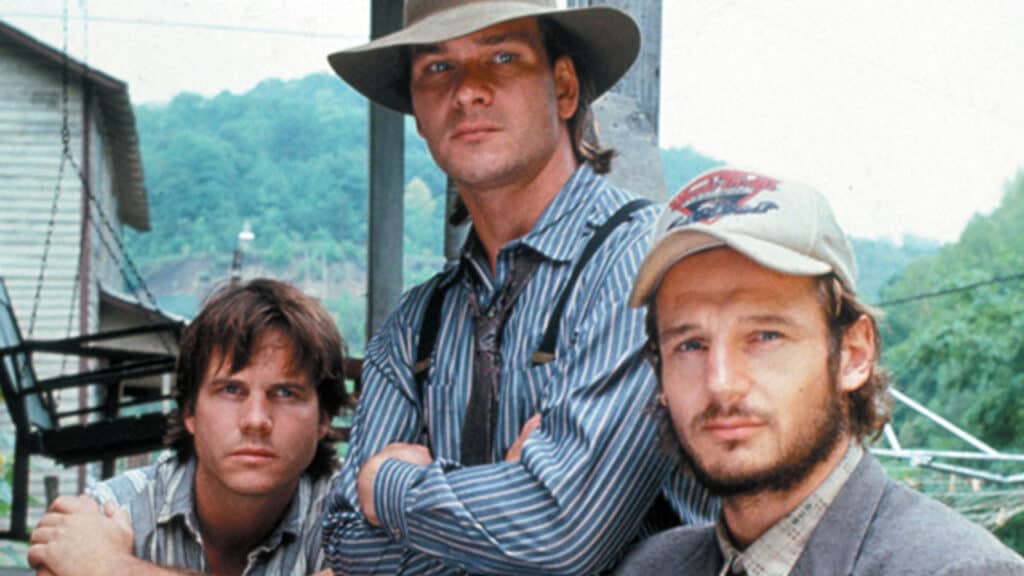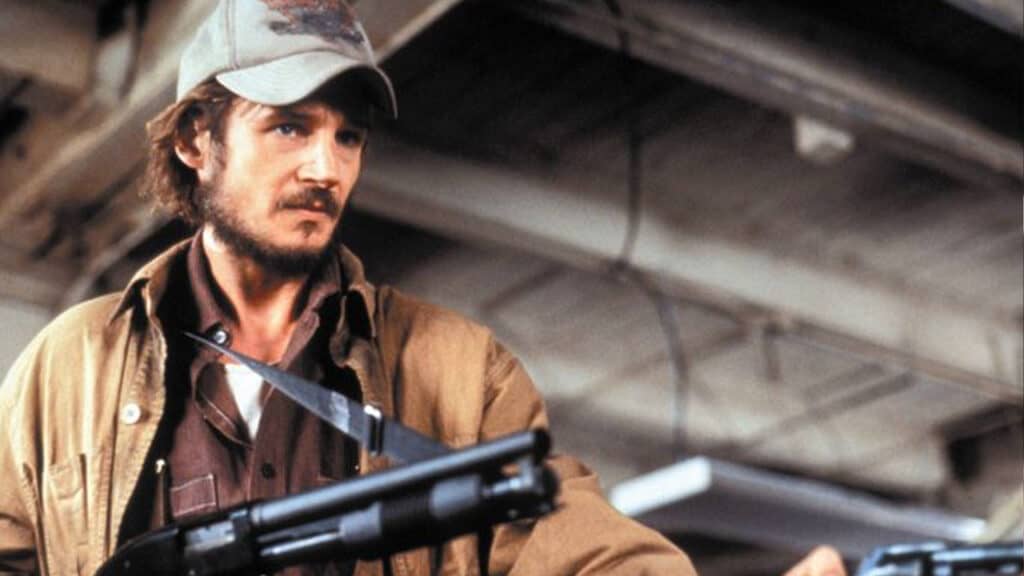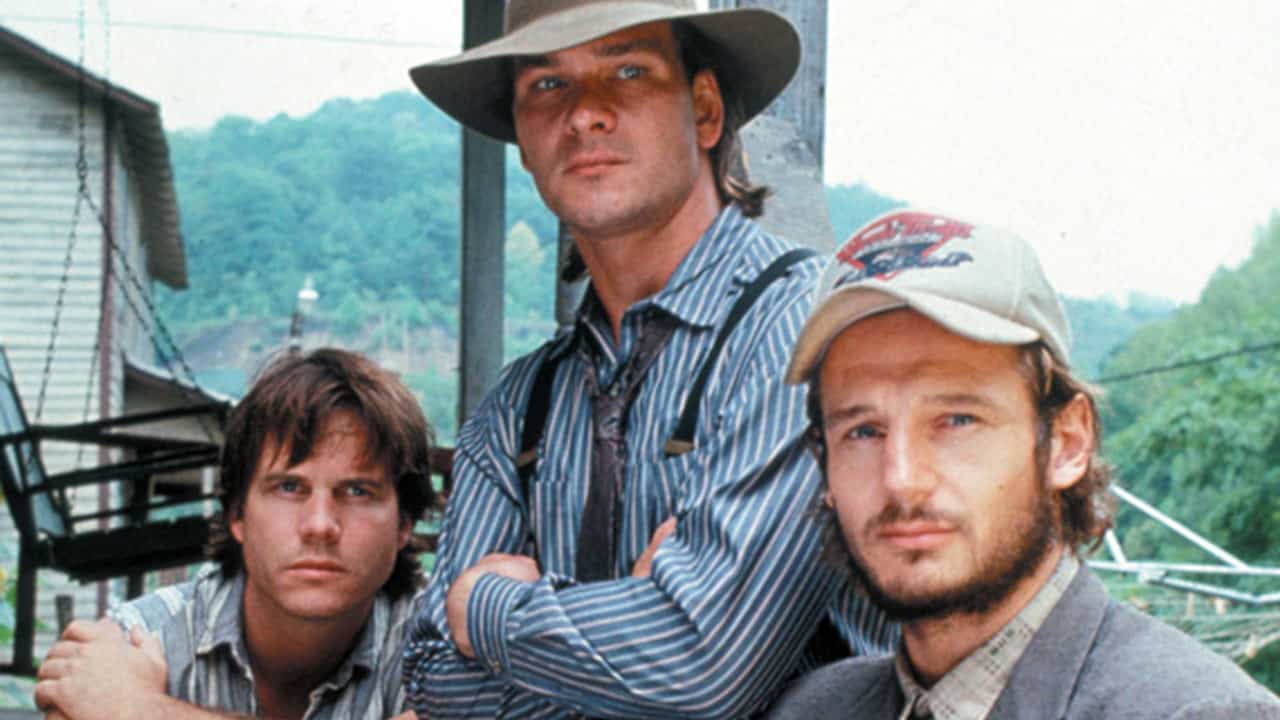We take a look back at the underrated 1989 action flick, Next of Kin, starring Patrick Swayze, Liam Neeson and Bill Paxton.
The passing of Patrick Swayze was enough to break your heart. Has there ever really been anyone quite like him? At his best, Swayze was the type of guy who was equally at home playing romantic leads as he was dropping bad guys in action fare. Swayze’s career peaked in 1987, the year he danced his way to the top of the box office in Dirty Dancing. It made him a giant star, with him not only having one of the top-grossing movies of the year but also a huge hit song in a track off the soundtrack album, “She’s Like the Wind”.
While traditional thinking would have led to Swayze acting in a whole slew of romantic movies, he had something a little different in mind. Swayze wanted to become an action hero. The fact is, he was a natural for the genre. His dance training and general physical prowess made him a natural at fight scenes, and while he was a good-looking dude, he wasn’t overly pretty and could believably play a badass. He also had fantastic hair, which was a prerequisite to be an action hero in the eighties, with his feathered hair perhaps only equalled by the God-like mullet sported by Kurt Russell.
While everyone remembers Road House (which is getting a buzzy remake), which, despite underperforming in 1989, became a massive cult classic, it wasn’t the only action flick Swayze made that year. Towards the end of 1989, he starred in another action movie called Next of Kin. While largely obscure in his filmography, it’s a better-than-average thriller anchored by Swayze’s charisma and a scene-stealing turn by a young Liam Neeson, who’s practically a co-lead here – and it’s a pick of ours for The Best Movie You Never Saw.

In Next of Kin, Swayze plays a Chicago cop named Truman Gates, who hails from the Appalachians. One of his younger brothers, Gerald, played by a young Bill Paxton, followed him to Chicago but was killed by Chicago mobsters who hijacked his truck. A psychotic muscleman for the mob coldly executes him, Adam Baldwin’s Joey Rossellini, much to the chagrin of his more even-tempered boss, Papa John, played by Andreas Katsulas, better known as the one-armed man from The Fugitive (which recently celebrated its 30th anniversary) and G’Kar from Babylon 5.
While Truman swears to bring the mobsters to justice, his older brother, Briar, played by Liam Neeson, isn’t havin’ it. He high-tails it to Chicago and declares war on the mobsters. It’s interesting to see him in action, as his role here pre-dates his later status as an action hero in movies like Taken. Neeson still makes movies that are a lot like Next of Kin, although this is certainly more energetic and action-driven than the lower-budgeted fare we usually get from Neeson these days.
As good as Neeson is, this is Swayze’s movie, effortlessly combining his romantic appeal with his action hero bonafides. He gets a better romantic story than usual for the genre, with him happily married to Helen Hunt’s elegant Chicago violinist, who becomes pregnant as the film progresses. This motivates Swayze to do things within the law, as he doesn’t want to endanger his family. Yet, as the movie goes on and the mob becomes more violent, Tucker’s rage is unleashed, leading to a balls-to-the-wall ending where Truman, armed with a bow and arrow, as well as a hillbilly army of pals, goes to war on the mafia.

While not as action-packed as Road House or Point Break, Next of Kin is a solid cop movie for Swayze. It’s the kind of B-programmer guys like JCVD, and Steven Seagal would be starring in by the decade’s end. It’s strange that Swayze never really managed to make it as an action hero, as his action movies are pretty good. Perhaps it was because so much of his target audience was women, and guys at the time probably viewed him as less manly than his contemporaries. That’s a huge mistake, though, as Swayze’s confidence makes him a guy whose vehicles have aged better than many others. Swayze’s machismo was lower-key, as he wasn’t afraid to be vulnerable or cry in his movies – something that Stallone and Russell also were perfectly comfortable doing, although they didn’t get the grief he did.

